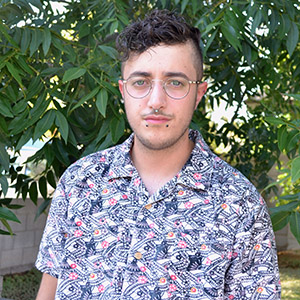ABSCISSION THEORY
“n. – 1. (botany) The normal shedding of a senescent plant part or organ (e.g. old leaf or ripe fruit) 2. (zoology) The intentional separation of a body part, such as the separation of a tail or autotomy, usually as a protective evading mechanism against predators…”
i understood trees in mid October,
the way the cello prayed & wove itself through leaves,
melody a critique of shadows outlined
in each vein drawing themselves in creases
as breeze would rend their touching edges—
i scraped myself awake
to find sidewalks littered
with a moving day, curtains drawn open,
clouds inching from chapped mouths,
light jackets, loose-leaf trampled flat on concrete.
a month beckoned & smiled for me,
shrugged, walked along,
glanced back every so often.
i have read those theorists
who pour my molten
body into a mold on the cedar shelf
with an amethyst geode & trash morsels
painted into a muffled story—stale crumbs
on a public floor. coils of jargon:
stamped belts, shower rods,
sweatshirts around safety faucets—
my folded shoulders, dry eyes
fixed on black-speckled laminate,
“quiet rooms,” hallways as peer-reviewed
analysis, distant collections of ink
blurred by snow, tinted breath,
watching my mother die before she knew me.
i understood the way soft necks
adhered to wood stalk
& drank light to their death—
red sandstone statements, fibrous phrases
drifting to earth as embers fall after the
short shout of combustion—
if my mother worried tenderly & does not now,
her hands worry still over what a misaligned fork
& brown napkin suggest.
my hands are bent to break the surface
of a salty gulf; they worry over shadows
cast about the curves in my leaves
& sentences scrawled over dirty tomes thrown
from tongues behind nameplates—
they trace the atonal grain
in the wood of a New Jersey bar, counter carved
with grooves of all the selves that had stopped there,
intricate tattoos drawn on a squirming corpse
rolled down a hot rural hill,
forgotten.
i smell myself as a term on the breath
of the world, & my infant head she let rest in her palm
(it was washed & nothing, but she held it)—
sutures now fused, a skull round & tossed
from thinker to thought to thinker
onto the pulp of what i understood in mid October
all to make neat piles,
give a proper address
to my trembling abscission
on the side of the road.
EASTER SUNDAY
i
A red undercloak
peeks from beneath your dress
as you wish for a river
to birth into. A hole
to sleep in. Her hand
vibrates at the cusp
of your breast & the juice
wears a gorge
in your neck,
marks you
like the bird’s
pecking post—
a thousand strokes
in intimate rows—
ii
On the edge
of the copse
you collect rotten
wood, tear a sleeve open
on exposed bone. Soon
a lung bursts
with invasive berries. You exhale
a fluttering red hem.
She opens her
hands to catch what comes
from your wrist: the watercolor study
the watercolor study
of a Monarch,
wings held in four fixed positions—
black tape stripped
from the frame. You think
nothing will sate her. You hold
a skirt or two above
your knees & wade.
TRANSITION AS MOURNING AS A HOUSE TO DECOMPOSE IN
Outside this dead wilderness, you keep stones
under the wall of eyes & melt your loss
before it. You lift an image from your favorite
song & recite the shape in your new voice
until you sound like a hay meter wailing
in miles & miles of grass.
You never trust doctors. You know
why—the strange gust of wind
pushing the spines of several mice
against your doorjamb—the look
on your mother’s face
when they strapped her down
by the wrists—the dried yellow
sweet clover you keep in a box on the top shelf
of your closet, like a disused uniform
you imagine yourself buried in. Each time
you touch the stem it loses a leaf
or two. You’d keep them
if you could, but some dying is good
to forget—the look on your mother’s
face when they strapped her
down by the wrists. The yellow notes
she wrote to remember
the names of everyday
objects. For a long while you wouldn’t trust
your own tongue. You were swallowing
things you should’ve coughed into a container.
You were using patterns to describe yourself
as if you’d been born tattooed
with a fucked-up blueprint. But really
there were vines fighting their way
through the walls to find you, to whisper
new visions of the act of existing
within a structure. This was how you began
to know the complex stillness of decay—
the way death-feeding creatures celebrate
a discarded carcass, press themselves
against each other—a touch born
of the food of death.

Elliot Rose Winter is a trans, nonbinary writer from New Jersey, currently living in Tempe, AZ. They are an MFA candidate in Poetry at Arizona State University, and a recipient of a Global Fellowship from the Virginia G. Piper Center for Creative Writing. They love animals, food, and heavy metal.

